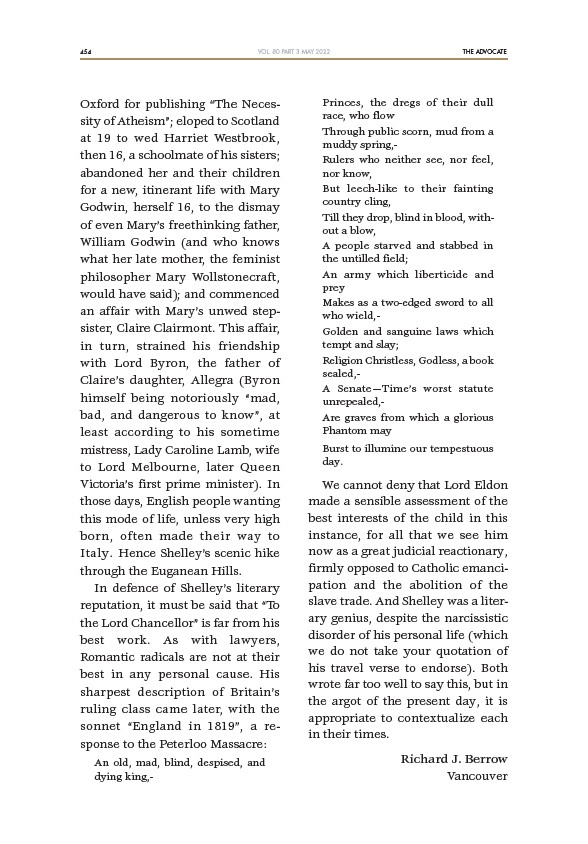
454 THE ADVOCATE
VOL. 80 PART 3 MAY 2022
Oxford for publishing “The Necessity
of Atheism”; eloped to Scotland
at 19 to wed Harriet Westbrook,
then 16, a schoolmate of his sisters;
abandoned her and their children
for a new, itinerant life with Mary
Godwin, herself 16, to the dismay
of even Mary’s freethinking father,
William Godwin (and who knows
what her late mother, the feminist
philosopher Mary Wollstonecraft,
would have said); and commenced
an affair with Mary’s unwed stepsister,
Claire Clairmont. This affair,
in turn, strained his friendship
with Lord Byron, the father of
Claire’s daughter, Allegra (Byron
himself being notoriously “mad,
bad, and dangerous to know”, at
least according to his sometime
mistress, Lady Caroline Lamb, wife
to Lord Melbourne, later Queen
Victoria’s first prime minister). In
those days, English people wanting
this mode of life, unless very high
born, often made their way to
Italy. Hence Shelley’s scenic hike
through the Euganean Hills.
In defence of Shelley’s literary
reputation, it must be said that “To
the Lord Chancellor” is far from his
best work. As with lawyers,
Romantic radicals are not at their
best in any personal cause. His
sharpest description of Britain’s
ruling class came later, with the
sonnet “England in 1819”, a response
to the Peterloo Massacre:
An old, mad, blind, despised, and
dying king,-
Princes, the dregs of their dull
race, who flow
Through public scorn, mud from a
muddy spring,-
Rulers who neither see, nor feel,
nor know,
But leech-like to their fainting
country cling,
Till they drop, blind in blood, without
a blow,
A people starved and stabbed in
the untilled field;
An army which liberticide and
prey
Makes as a two-edged sword to all
who wield,-
Golden and sanguine laws which
tempt and slay;
Religion Christless, Godless, a book
sealed,-
A Senate—Time’s worst statute
unrepealed,-
Are graves from which a glorious
Phantom may
Burst to illumine our tempestuous
day.
We cannot deny that Lord Eldon
made a sensible assessment of the
best interests of the child in this
instance, for all that we see him
now as a great judicial reactionary,
firmly opposed to Catholic emancipation
and the abolition of the
slave trade. And Shelley was a literary
genius, despite the narcissistic
disorder of his personal life (which
we do not take your quotation of
his travel verse to endorse). Both
wrote far too well to say this, but in
the argot of the present day, it is
appropriate to contextualize each
in their times.
Richard J. Berrow
Vancouver